Rebecca Eanes's Blog, page 20
October 30, 2014
Liking the Child That You Love
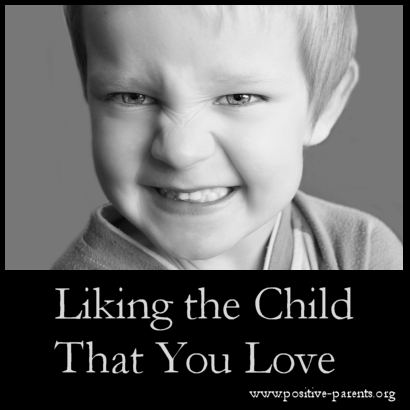
There is a lot of talk about unconditionally loving our children but perhaps not enough about how important it is to like them. As our sweet bundles grow and test boundaries and stretch our patience, it can become all too easy to fall into the insidious trap of looking at that child through a negative lens. Because we only see what it is we are looking for, we begin to only see the testing, the misbehavior, the whining, the aggression, the child who just will not go to sleep. Then ever so slowly, without us mindfully realizing what is occurring, we begin to feel a pang of resentment – of dislike. At this point, it becomes very difficult to notice the good, to see beyond the faults into the heart of that child which beats with goodness and love and purpose. Resentment is blinding.
While it's true that children need our love to thrive, what we've generally swept under the rug is that they need us to like them, too. They need us to see them, see who they are, and to like what it is that we see, because this ultimately is how they come to see themselves. Therefore, it's essential to the well-being of our children and to the peace and contentment within our homes that we learn to see through a positive lens, even through times of trial.
If you're struggling with feelings of resentment or not liking your child right now, could one of these be the cause?
1. You were expecting/hoping for someone different, easier, more like you, more like your spouse, a better sleeper, not so intense, etc.
Continue reading here, at creativechild.com.
Published on October 30, 2014 17:53
October 16, 2014
5 Things That Keep Us From Fully Enjoying Our Young Children by Erin Leyba
by Erin Leyba, LCSW, PhDChildren are naturally full of innocence, joy, exuberance, and wonder. Just spending time with them can be tremendously healing. They can help us recover the playful parts of ourselves, enjoy the moment, and see the world through fresh eyes. However, there are certain things that keep us from fully enjoying our children.Trying to pack in too muchIn today’s super-stretched culture of achievement, we sometimes pack in too much and end up getting annoyed when our children can’t keep up the pace. Too many work hours, house projects, parties, preschools, basketball classes, ballet recitals, hockey games, and piano lessons can leave us wilted or high-strung. We might take children to Target, the park, and their sister’s play at school in a single morning, which invites power struggles and not-so-perfect behaviors. The slower we go and the fewer transitions we have with children, the more we tend to enjoy them.Not feeling happy ourselvesAfter having a baby, lives of both mothers and fathers change completely. Free time, work, and friendships look vastly different. There tends to be a crisis period in which parents grieve the loss of their “old life” and search for new ways to make themselves happy. Research suggests that having a baby can also significantly stress a partnership. As parents negotiate changes in chores, workloads, childcare, and recreation, conflicts arise. If we take proactive steps, such as journaling, going to counseling, talking to friends, engaging in self-care, and communicating, we can move toward wellness. It’s hard to enjoy children when we’re in a funk ourselves.Lack of awareness of developmental issuesChildren’s developmental phases might include: it’s all about me; I’m trying to be my own person so don’t tell me what to do; I’m going to test out my powerful self; mine!; I’m going to determine the boundaries of this place; and I want to do things on my own terms. Children have developmental difficulty sharing until at least age 2 or 2 ½ but really until 5, and true empathy does not mature in children until age 6. It’s great to condition and encourage children to share and be empathic before then, but we may not always be completely successful. When we shift our expectations of how children “should be” behaving, we can create room to be more understanding, patient, and content with them.Smart distractionsThe invention of the smart phone and other intelligent devices has made it easier to bring our work, email, social media, news, grocery shopping, weather forecast, job search, sports videos, and exercise software to the park, playroom, rocking chair, dinner table, and bleachers on the sides of kids’ sports games. Distractions like a smart phone can pull us away from our kids, and they can also cause us to not enjoy our kids as much. With an itchy beeping, tinkling, jiggling, tweeting, dinging, alarming device glued to our fingertips, it can be hard to throw the football around at the park, build with Legos, or cover our eyes for a game of peekaboo. With the world in our pockets, it can be hard to focus on or appreciate the people in front of us.Not honoring the first five years as a unique, temporary time in lifeIt’s likely that never again will you be as needed and as in demand by your family as you are when your kids are 0 to 5 years old. As you give baths, change diapers, feed the baby, toilet train, wake up all night, play, read books, and give children more attention than you’ve ever given anyone, you may feel like your family life is pulling you away from the rest of your life. Your house may be messy, your grass long, and your emails unanswered. Remembering that this is a very temporary, very unique time in life can alleviate some of the unsettling feelings associated with changes regarding work, friends, family, or leisure pursuits.In the blink of an eye, children grow up. Consciously savoring adorable, happy, and playful momentsensures we won’t regret our children’s early, most formative years.All rights reserved.

Erin Leyba, LCSW, PhD, mom to three, is an individual and marriage counselor for new parents in Chicago’s western suburbs. Follow her blog at www.parenthappy.orgor on Facebook at https://www.facebook.com/www.parentha...

Erin Leyba, LCSW, PhD, mom to three, is an individual and marriage counselor for new parents in Chicago’s western suburbs. Follow her blog at www.parenthappy.orgor on Facebook at https://www.facebook.com/www.parentha...
Published on October 16, 2014 09:45
October 15, 2014
Solutions for Sibling Rivalry

If you're like me, you dreamed that your children would be best friends from the start. It's both heartbreaking and frustrating when your children fight and squabble with each other, but there are things you can do (and not do) to help build their relationships with each other.
It can be easy to compare siblings. "Your brother was potty trained by now! Why are you being so difficult! "" Your sister doesn't have these problems at school!" Sometimes these statements just bypass our brains and fly right out of our mouths, but they only serve to fuel rivalry. Even seemingly positive statements can have a negative consequence. "You are so much better at this than your sister" may seem like a compliment to the child you're speaking to, but it still encourages a competition mindset. And of course favoring one child over another will always cause resentment. We inadvertently set them up for conflict with these unconscious habits.
If you want a peaceful home, then peace has to be made a priority. This means the children are absolutely not allowed to call names, be aggressive, or be rude to their siblings. When conflicts arise, I propose the peace circle. When 2 or more children argue, they should go to the peace circle (or table, rug, or couch), and here they are taught peaceful conflict resolution.
Continue reading at creativechild.com
Published on October 15, 2014 17:59
September 16, 2014
The Top 5 Behaviors that Cause Parents to Lose Their Cool
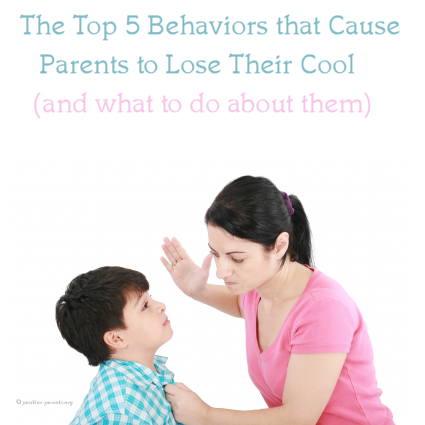 Image courtesy of David Castillo Dominici / FreeDigitalPhotos.net
Image courtesy of David Castillo Dominici / FreeDigitalPhotos.netI have just finished a 5-part series for Creative Child Magazine titled The Top 5 Behaviors that Cause Parents to Lose Their Cool (and what to do about them).
Here are the links to view them on the Creative Child Magazine website.
#5 Back Talk
#4 Tantrums
#3 Not Listening
#2 Whining
#1 Aggression
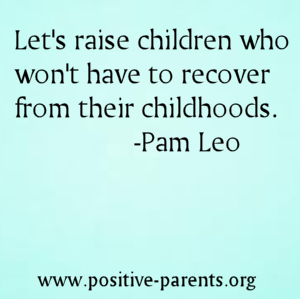
Published on September 16, 2014 18:29
September 13, 2014
Mother's Time Out - Free Telesummit for YOU
 Calling all Mothers!
Calling all Mothers!Are you having a hard time finding downtime for yourself and your children?
Do you sometimes feel a disconnection to your kids and wonder why mothering is not how you imagined?
YOU'RE INVITED to take a Mother's Time Out!
This FREE Telesummmit is for YOU!It is time. For Mother’s to take a Time Out. Gather, share, learn, reflect, and make some small simple changes to transform your relationship with yourself and your children.
REGISTER HERE: http://bit.ly/1oGRdN6
15 speakers offer powerful insights to help you become the mother you want to be.FREE ONLINE EVENT – SEPT. 15TH-OCT. 3RD

Published on September 13, 2014 08:54
September 12, 2014
Dangling Love

Picture this:
Sara has been very busy with the children today. She has played in the floor with her toddler, laughing, making memories. They made a car out of a cardboard box in between nursing and caring for her infant as well. The children are well taken care of and happy, but the house... Well the mess from the day's play is lying around when her husband, John, gets home. John shoots her a look of disapproval that makes her heart sink. Hasn't she been good enough, today? She goes over to connect with a hug, and he withdrawals from her. Feeling the sting of rejection, she immediately starts picking up the mess. John goes to take a shower. When he gets out, the mess is picked up, and the house looks good. He nods and gives his wife a loving hug. "This looks much better. Thank you."
What sort of feelings did this story bring up for you? How did it leave you feeling about John? About Sara? What can you deduce about their relationship from this story?
The question was posed on my Facebook page recently, "If he doesn't pick up his toys, should I give him a hug as a reward?!"
Friends, love is not a reward. Hugs, attention, affection, kind words - these are not rewards to be dangled in front of a child, only given when he performs to our liking. These are a child's lifeline. They should be given without condition, without hesitation. Always.
We've developed this rather strange idea that loving children too much is bad for them, but if we offer just enough love at the right times, they will jump through hoops to get it. And they probably will, but they shouldn't have to. Withholding love and affection most certainly works to control a child because this is very real need, and they must get it met in whatever way they can, but take a moment to stop and feel the sadness that the child feels - the rejection, the feeling of needing to get it right before being worthy of love and affection.
I imagine Sara feeling a sense of relief, and even loved, once John gave her his affection and approval. I also imagine there is emotional instability and pain.

Please don't make children earn your affection. As Dr. Gordon Neufeld said, "If children want attention, then why on earth wouldn't we give it to them?"
Take a moment to watch this video in which Dr. Neufeld explains why children need to be able to rest in our love.
Too much love won't spoil. Kindness doesn't provoke poor behavior. Respect doesn't invite disrespect. This is backwards thinking which has caused us to feel trapped into being too harsh for too long. Generations of children are still searching and longing for unconditional love.
Let's make a change.
Published on September 12, 2014 08:06
August 29, 2014
How to Talk to Kids - Guest Post by Lori Petro
Parenting educator Lori Petro, founder of TEACH Through Love is offering a 4 part FREE training series on conscious communication. Sign up here.
*******
Are you wondering how you can connect more deeply with your child? Would you like to know how to talk to kids using peaceful conflict resolution strategies to ease tension, or calm aggressive behavior in your children? Often, we can be triggered by our own unresolved traumas - big and small - and this can make it extremely challenging to remain compassionate as we confront our kid's big, explosive emotions. Kids are great at reminding us when we veer from the path. Love - Connection - Repair

Your kids feel it and RESPOND to it!! The biggest challenge to using the kind of respectful language that you want your kids to emulate is your own patterns of behavior and habits of reacting, which are based on FEAR. The emotional baggage that you carry around can be unzipped without your consent. Then, you unleash unrestrained emotions and actions driven by automatic unconscious memories and feelings. Your past can trip you up, triggering you into reactionary patterns, and causing you to get stuck in a cycle of disrespect, defiance and demands. If you had a punitive childhood -- Can you think back to a time when you were younger, smaller, less experienced - maybe some time in the first 10-15 years of life when you were judged for your behavior, or maybe punished, shamed or isolated? Maybe it was a time you felt unheard as you tried to explain your thought process or you felt anxious or angry as you tried to get what you needed. What did it feel like to be evaluated and told that you were naughty, ungrateful, a mess, trouble, or that you would suffer consequences or be isolated from peers, family or activities you loved if you did not listen. What parts of your body are awakened when you let those emotions surface now? Now, what would it have felt like if the adults in your life had...
Held the limits firmly, with compassion and non-judgment for your less than experienced ways?Calmed their anger and approached you with an honest intention to help rather than control or convince?Maintained tolerance for your youthful curiosity and patience for your unskilled demands and bargaining? What would it be like if we could spend the first 20 years of our lives hearing that we were doing our best? When we feel understood, we can hear and process NEW information. Whenever you go in with the attitude of "you're wrong" - in return you are likely to receive defensiveness. Assumptions (right or wrong) tend to cause the other person to shut down to anything you have to say because no one likes to be accused of being "wrong." Compassionate requests are more likely to get you heard. Fear gives us an easy, seemingly negligible, tool to use for obedience. A raised eyebrow coupled with a certain tone - "growly" as my daughter's favorite book character "Junie B Jones" would say - are sometimes effective, but only sometimes. Ultimately, fear keeps us focused on the outcome - it leads us to want to control behavior so we can feel better faster but what does that teach kids about the world?
that others can influence our behavior (rather than lead us to reflect on how our behavior has affected others).that it is okay to use our power to dominate others. that it doesn't matter what we think or feel - we simply must obey. Consciously parenting is about thinking in new ways - ways that build your relationship, because when you do, your kids will WANT to cooperate with your requests. When you communicate respectfully, your children will do the same! It's not about scripts, exact words, or all-or-nothing choices, nor should your goal be "making kids obey." It's not that you say these EXACT words or even ALL the words - but that you go in with the attitude and intention of the Connecting Words rather than the attitude and intention of the Disconnecting Words.


 Lori Petro is a Speaker, Advocate & Parent Educator. She founded TEACH through Love as a vehicle to help families heal the cycle abuse and trauma through the relationship-building tools of empathy, compassionate communication and peaceful conflict resolution. As an adult with Aspergers, Lori understands the demands of parenting kids with special needs and believes that by building strong bonds, we can cross the bridge to understanding the behaviors and needs of all kids. Lori is a sought-after speaker who consults privately with clients, teaches online and shares her insights and information in her weekly TEACHable Moments videos. Connect with Lori on Twitter @TEACHthruLove, Facebook and her Website: http://www.teach-through-love.com.
Lori Petro is a Speaker, Advocate & Parent Educator. She founded TEACH through Love as a vehicle to help families heal the cycle abuse and trauma through the relationship-building tools of empathy, compassionate communication and peaceful conflict resolution. As an adult with Aspergers, Lori understands the demands of parenting kids with special needs and believes that by building strong bonds, we can cross the bridge to understanding the behaviors and needs of all kids. Lori is a sought-after speaker who consults privately with clients, teaches online and shares her insights and information in her weekly TEACHable Moments videos. Connect with Lori on Twitter @TEACHthruLove, Facebook and her Website: http://www.teach-through-love.com.
*******
Are you wondering how you can connect more deeply with your child? Would you like to know how to talk to kids using peaceful conflict resolution strategies to ease tension, or calm aggressive behavior in your children? Often, we can be triggered by our own unresolved traumas - big and small - and this can make it extremely challenging to remain compassionate as we confront our kid's big, explosive emotions. Kids are great at reminding us when we veer from the path. Love - Connection - Repair

Your kids feel it and RESPOND to it!! The biggest challenge to using the kind of respectful language that you want your kids to emulate is your own patterns of behavior and habits of reacting, which are based on FEAR. The emotional baggage that you carry around can be unzipped without your consent. Then, you unleash unrestrained emotions and actions driven by automatic unconscious memories and feelings. Your past can trip you up, triggering you into reactionary patterns, and causing you to get stuck in a cycle of disrespect, defiance and demands. If you had a punitive childhood -- Can you think back to a time when you were younger, smaller, less experienced - maybe some time in the first 10-15 years of life when you were judged for your behavior, or maybe punished, shamed or isolated? Maybe it was a time you felt unheard as you tried to explain your thought process or you felt anxious or angry as you tried to get what you needed. What did it feel like to be evaluated and told that you were naughty, ungrateful, a mess, trouble, or that you would suffer consequences or be isolated from peers, family or activities you loved if you did not listen. What parts of your body are awakened when you let those emotions surface now? Now, what would it have felt like if the adults in your life had...
Held the limits firmly, with compassion and non-judgment for your less than experienced ways?Calmed their anger and approached you with an honest intention to help rather than control or convince?Maintained tolerance for your youthful curiosity and patience for your unskilled demands and bargaining? What would it be like if we could spend the first 20 years of our lives hearing that we were doing our best? When we feel understood, we can hear and process NEW information. Whenever you go in with the attitude of "you're wrong" - in return you are likely to receive defensiveness. Assumptions (right or wrong) tend to cause the other person to shut down to anything you have to say because no one likes to be accused of being "wrong." Compassionate requests are more likely to get you heard. Fear gives us an easy, seemingly negligible, tool to use for obedience. A raised eyebrow coupled with a certain tone - "growly" as my daughter's favorite book character "Junie B Jones" would say - are sometimes effective, but only sometimes. Ultimately, fear keeps us focused on the outcome - it leads us to want to control behavior so we can feel better faster but what does that teach kids about the world?
that others can influence our behavior (rather than lead us to reflect on how our behavior has affected others).that it is okay to use our power to dominate others. that it doesn't matter what we think or feel - we simply must obey. Consciously parenting is about thinking in new ways - ways that build your relationship, because when you do, your kids will WANT to cooperate with your requests. When you communicate respectfully, your children will do the same! It's not about scripts, exact words, or all-or-nothing choices, nor should your goal be "making kids obey." It's not that you say these EXACT words or even ALL the words - but that you go in with the attitude and intention of the Connecting Words rather than the attitude and intention of the Disconnecting Words.


 Lori Petro is a Speaker, Advocate & Parent Educator. She founded TEACH through Love as a vehicle to help families heal the cycle abuse and trauma through the relationship-building tools of empathy, compassionate communication and peaceful conflict resolution. As an adult with Aspergers, Lori understands the demands of parenting kids with special needs and believes that by building strong bonds, we can cross the bridge to understanding the behaviors and needs of all kids. Lori is a sought-after speaker who consults privately with clients, teaches online and shares her insights and information in her weekly TEACHable Moments videos. Connect with Lori on Twitter @TEACHthruLove, Facebook and her Website: http://www.teach-through-love.com.
Lori Petro is a Speaker, Advocate & Parent Educator. She founded TEACH through Love as a vehicle to help families heal the cycle abuse and trauma through the relationship-building tools of empathy, compassionate communication and peaceful conflict resolution. As an adult with Aspergers, Lori understands the demands of parenting kids with special needs and believes that by building strong bonds, we can cross the bridge to understanding the behaviors and needs of all kids. Lori is a sought-after speaker who consults privately with clients, teaches online and shares her insights and information in her weekly TEACHable Moments videos. Connect with Lori on Twitter @TEACHthruLove, Facebook and her Website: http://www.teach-through-love.com.
Published on August 29, 2014 08:58
August 18, 2014
Thank You Sale (Plus a Special for Subscribers Only!)
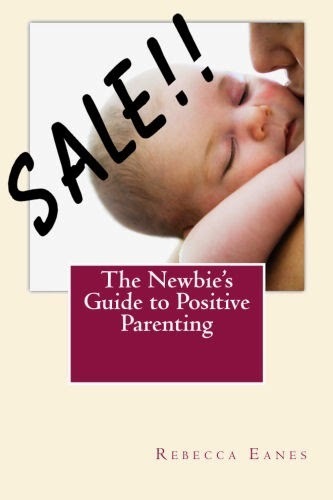 I appreciate my Positive Parenting: Toddlers and Beyond Community! To say "thank you for being here" I'm offering you my best-selling eBooks "The Newbie's Guide to Positive Parenting" and "Positive Parenting in Action" for $2 off the current price!
I appreciate my Positive Parenting: Toddlers and Beyond Community! To say "thank you for being here" I'm offering you my best-selling eBooks "The Newbie's Guide to Positive Parenting" and "Positive Parenting in Action" for $2 off the current price!Click here to get the PDF version of The Newbie's Guide to Positive Parenting for $1.99.
 Click here to get the PDF version of Positive Parenting in Action for $1.99.
Click here to get the PDF version of Positive Parenting in Action for $1.99.If you're a subscriber to my newsletter, watch your inbox! You'll get an extra discount!
Not a subscriber? Subscribe now and you'll be sent an email with your special discount! Just enter your email in this box and click "go!"
Published on August 18, 2014 09:53
July 23, 2014
Wired to Connect - Discipline Shouldn't Hurt
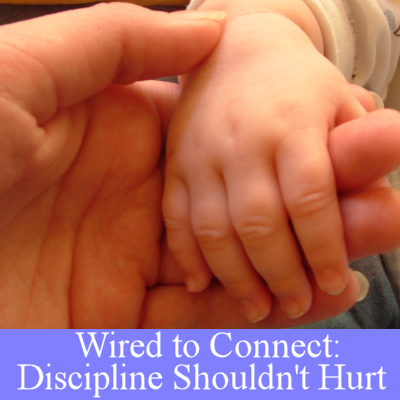
Across many studies of mammals, from the smallest rodents all the way to us humans, the data suggests that we are profoundly shaped by our social environment and that we suffer greatly when our social bonds are threatened or severed. When this happens in childhood it can lead to long-term health and educational problems. We may not like the fact that we are wired such that our well-being depends on our connections with others, but the facts are the facts. - Matthew Lieberman, neuroscientist and author of Social: Why Our Brains are Wired to Connect [1]
Are we being too soft on our kids? I hear that a lot - that parents are "too soft." The idea that we are supposed to be hard on children and that anything less is poor parenting is disturbing and harmful.
We understand about the human brain, connection, attachment, and the value of relationship much more now than ever. We know that the relationship we have with our children affects their development, literally wiring their brains.
Let's go to a little neuroscience 101, because it's important to understand a little bit about how the brain works in order to understand why child discipline needs to change.
I'm no doctor or neuroscientist, so I'm going to directly quote one here. This is from Amy Banks, M.D., director of Advanced Training at the Jean Baker Miller Training Institute at the Wellesley Centers for Women; instructor of Psychiatry at Harvard Medical School; and author of Post-Traumatic Stress Disorder: Relationships and Brain Chemistry.
Neuroscience is confirming that our nervous systems want us to connect with other human beings. A good example of this is mirror neurons, which are located throughout the brain and help us read other people's feelings and actions. They may be the neurological underpinnings of empathy - when two people are in conversation they are stimulating each other's mirror neuron system. Not only will this lead to movement in similar muscles of the face (so the expressions are similar) but it also allows each to feel what the other is feeling. This is an automatic, moment to moment resonance that connects us. There have been studies that look at emotions in human beings such as disgust, shame, happiness, where the exact same areas of the brain light up in the listener who is reading the feelings of the person talking. We are, literally, hardwired to connect. [2]
This is really interesting in the context of the parent-child relationship when we look at mirror neurons. Think about what happens with those mirror neurons when you scowl, slap, smack, or yell at your child. As their brain searches to read your feelings and actions, it begins to light up in those same areas - irritation, anger, aggression, and frustration. However, what lights up in their brains when you approach them with softness, gentleness, and empathy?
The distress of social pain is biologically identical to the distress of physical pain. What causes social pain in the context of the parent-child relationship? Rejection. Isolation. Dr. Banks explains:
I believe that one of the seminal studies that supports a relational neurobiology is something called SPOT (Social Pain Overlap Theory.) A group of researchers at UCLA, looked at the overlap between social pain and physical pain. They designed a benign computerized experiment that gradually excluded people from a multi-player game. What they found was the area that lit up in the brain for that kind of social rejection—the anterior cingulate—was the exact same area that lights up for the distress of physical pain. So the distress of social pain is biologically identical to the distress of physical pain. Most people in our culture understand that physical pain is a major stressor, but we often reject the idea of social pain. [2]
When asked if this can impact a person's physical health as well, Dr. Banks says:
Yes, being pushed out of social relationships and into isolation has health ramifications. In fact, there was a book done by health advocate Dr. Dean Ornish, called Love and Survival. There has been study after study done on the positive impact of loving relationships. What he had said at the time in that book was that if we had a drug that did for our health what love does, it would far outsell anything that has ever been made. The efficacy is that potent. But we downplay the importance of love and connection in a culture based on the success of “the rugged individual.” People in our culture need to understand that healthy connection can reduce pain on all levels. [2]Yes, we are a culture that downplays love and connection and holds tough discipline in high esteem. We train our children by use of pain; either physical pain or social pain. Which is really quite a paradox as children don't learn well through pain. The fear created by being hit or feeling the threat of disconnection from a primary attachment figure triggers the fight or flight response. By it's very nature, this bypasses the rational mind and puts people in attack mode, thereby inhibiting learning.
Why are we having such difficulty in letting go of tough discipline? There's a scientific answer for that as well. The idea that pain or discomfort should accompany lessons is still deeply rooted in our culture, and though the tides are slowly turning as the evidence against it continues to pile in, the use of physical or social pain is still the main method of disciplining children. Dr. Michael Shermer says this:
We form our beliefs for a variety of subjective, personal, emotional, and psychological reasons in the context of environments created by family, friends, colleagues, culture, and society at large; after forming our beliefs we then defend, justify, and rationalize them with a host of intellectual reasons, cogent arguments, and rational explanations... Once beliefs are formed the brain begins to look for and find confirmatory evidence in support of those beliefs, which adds an emotional boost of further confidence in the beliefs and thereby accelerates the process of reinforcing them, and round and round the process goes in a positive feedback loop of belief confirmation.
Dr. Shermer outlines the numerous cognitive tools our brains engage to reinforce our beliefs as truths and to insure that we are always right.[3]
Basically, we have formed our belief in tough discipline because our families, friends, and culture still support it, and once we have formed that belief, we keep looking to justify it, so we disregard the scientific evidence that proves us wrong. Some of us, of course, are open and receptive to this "new" information, and while I'm sure there's a fascinating scientific explanation for that as well, spiritually I feel that many of us are being led to this path of love and connection.
Blah blah neuroscience. What do I DO?
I knew you were going to ask that. Instant messaging, fast food, magic pills - we like instant gratification, which is another reason smacking and time out are so popular. One thwap and the kid stops immediately. Easy. Instilling real self-discipline takes more time and effort, just like calling a friend up for a chat, preparing a nutritious meal, or exercising regularly, but the payoff is greater. Here are some tips for putting away the tough discipline and teaching through connection.
Before Misbehavior:
Build your relationship. This is the foundation and you can't build anything until you have this. How? Start where you are. If your child is an infant, build trust by responding to cries quickly and with empathy. Bond by lots of talking, touch, and eye contact. If you have a young child, play is the key to connection. Spend quality time every day entering your child's world, connecting through play and stories and snuggles. Learn their love language. With older children, get to know them, really know them - what they like and dislike, how they feel about things, what makes them excited, what they are passionate about. Talk with them, not to them. In all stages, model the behavior you want from your child. Showing them how to be is more powerful than telling them how to be.
Teach proactively. Don't wait for an issue to arise before you teach your child. Teach about handling emotions and life situations through play, when everyone is calm and happy. Use toys to act out scenarios. Role play. Practice at home things like eating in a restaurant or sitting through a service or class. Put on a puppet show to raise awareness about bullying or some other issue your child will face. Look through magazines and point out faces and talk about the emotions of those people. Talk about what you watch on television or what they heard at grandma's house. Teach them calm-down techniques like deep breathing before they get angry. Children are more receptive to lessons when calm, and engaging through play enhances learning.
During Misbehavior:
Remove your child from the situation. If he hit his friend, take him to a private area and get him to calm down. Figure out what prompted him to hit. The action is a clue. Find out what it's pointing to and look for the solution. He may need more emotion coaching, tools to calm himself, a nap, or some food. Hitting him to teach him not to hit isn't the answer.
Is your tween giving you attitude? Walk away. Refuse to be talked to disrespectfully. That doesn't mean you start talking to her disrespectfully to teach her that lesson - that's counterproductive. Simply "I won't be talked to like this. I'll be happy to talk with you when you can be respectful."
Did your child bring home terrible grades and you know he didn't try? It's a problem that needs a solution. Talk with him. Sure, taking his electronics away will make you look pretty powerful, but how does it teach him study skills or motivate him to make better grades? Is he facing a problem at school? Is he being bullied? Is he struggling in a relationship at home? Does he need a tutor? Is he suffering from low self-esteem? Find the root of the problem and work on correcting it. It takes more work than removing electronics, but you won't always be there to take his stuff away. He needs to learn how to manage himself.
Is your daughter whining? Whining is a more mature form of crying, and while it can be very grating on the nerves, it's a signal of a deeper issue. Ignoring the child might make whining stop temporarily, but you need to know why she's whining in the first place. Does she feel powerless? Maybe she needs more choices. Is she overtired? Adjust bedtime.
After Misbehavior:
The hitting scene is over, your child's brain is now regulated (calm), now you teach. Refer to "Before the Misbehavior." Tween's attitude is better? She's now ready to talk respectfully? Refer to "Before the Misbehavior." The child with the bad grades? Follow up with him and his teacher. The way you do that really depends on what you found out was the reason behind the bad grades in the first place. When you come from a place of teaching rather than controlling, you'll know what to do. Whining over? Teach her about communication skills and strong voices.
Quick Summary:
1. Connect! Build your relationship. Build trust. Be on the same team. Work with, not against.
2. Misbehavior is communication. What is it saying? Look for the problem causing the misbehavior. Dr. Neufeld says, "The guiding principle of the incident is to do no harm." Please watch this. Correction doesn't need to be snappy or harsh. Also, it is helpful to approach it with the idea of building up rather than tearing down. Try "I see you're very angry. I'm going to take you to our calm place so you don't hurt your brother. I know you wouldn't want to hurt him. You're a really good sister." Or "Wow, you must be upset to speak to me like that. It's not like you to be disrespectful. Let's talk when you're feeling ready." Or simply "The walls are covered in marker. Here, use this to wipe it off."
3. After you get through the incident, move back into connection and teaching. Show them how to repair relationships and forgive others by modelling it now.
As you can see, positive parenting is quite the opposite of permissive parenting. It is highly involved, proactive parenting. The answers aren't always clear and easy. A good guiding principle: How does this affect our relationship?
Resources:
[1] http://www.scientificamerican.com/art...
[2] http://www.wcwonline.org/2010/humans-...
[3] http://www.michaelshermer.com/the-bel...
Published on July 23, 2014 11:18
July 20, 2014
Erupting Ice!

What happens when you mix water and baking soda and then freeze it? You get lovely ice blocks to stack and play with.
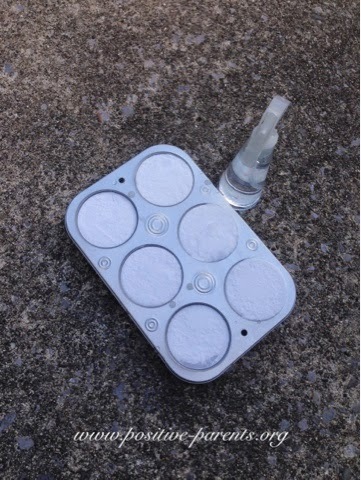
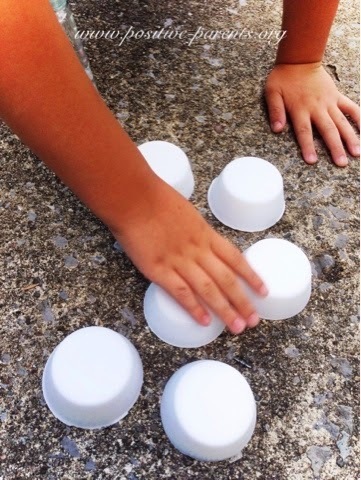
So, then what happens when you spray vinegar on them?
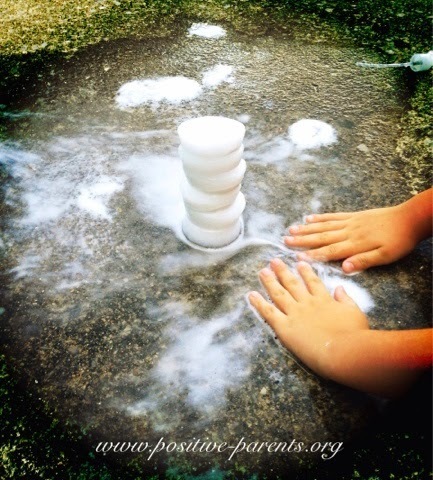
Cool science on a hot summer day. :)
I wonder what happens if you add salt and sprinkles?
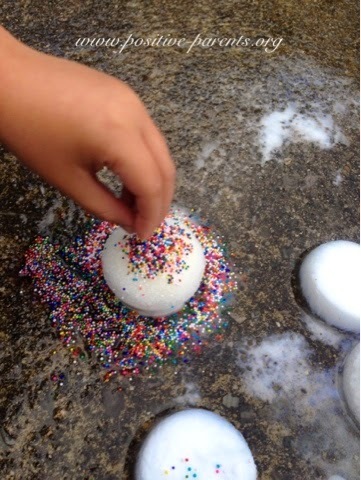
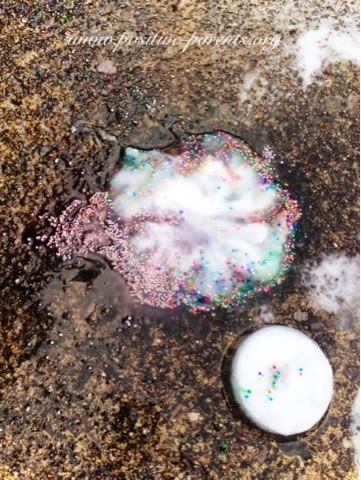
"It looks like a rainbow swirl, mom!"
I was out of food coloring that day but rainbow erupting ice would be awesome!
Have a playful day!
Published on July 20, 2014 08:58



